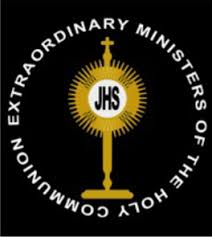EXTRAORDINARY MINISTER OF HOLY COMMUNION
An extraordinary minister of Holy Communion in the Catholic Church is, under the 1983 Code of Canon Law, “an acolyte, or another of Christ’s faithful deputed”, in certain circumstances, to distribute Holy Communion. The term “extraordinary” distinguishes such a person from the ordinary minister of Holy Communion, namely a bishop, priest or deacon. Canon law permits that “[w]here the needs of the Church require and ministers are not available, lay people, even though they are not lectors or acolytes, can supply certain of their functions, that is, exercise the ministry of the word, preside over liturgical prayers, confer baptism and distribute Holy Communion, in accordance with the provisions of the law.” The term “lay people” does not distinguish between men and women.
Function
The extraordinary minister’s function is to distribute Holy Communion, either within Mass or by taking it to those parishioners and residents who are unable to attend Mass due to illness, injury, or disability, when an ordained minister (bishop, priest or deacon) is absent or impeded. In order to avoid confusion about this function, an extraordinary minister of Holy Communion is not to be called a “special minister of Holy Communion”, nor an “extraordinary Minister of the Eucharist”, nor a “special minister of the Eucharist”. Ten years before publication of the 1983 Code of Canon Law, some of these expressions were used in the instruction of the Sacred Congregation of the Sacraments Immensae caritatis of 29 January 1973. They are now reprobated. The only minister of the Eucharist (that is, someone able to confect the Eucharistic species with bread and wine) is a priest or bishop.
At Mass
In every celebration of the Eucharist, there should be a sufficient number of ministers of Holy Communion so that it may be distributed in a reverent and orderly manner. Bishops, priests and deacons distribute Holy Communion in virtue of their office as ordinary ministers of the Body and Blood of the Lord. When the size of the congregation or the incapacity of the bishop, priest, or deacon requires it, the celebrant may be assisted by other bishops, priests, or deacons. If such ordinary ministers of Holy Communion are not present, “the priest may call upon extraordinary ministers to assist him, i.e., duly instituted acolytes or even other faithful who have been deputed for this purpose. In case of necessity, the priest may also depute suitable faithful for this single occasion (GIRM 162).”
Preparation
Extraordinary Ministers of Holy Communion should receive sufficient spiritual, theological, and practical preparation to fulfill their role with knowledge and reverence. In all matters they should follow the guidance of the diocesan bishop ( Norms for the Distribution and Reception of Holy Communion Under Both Kinds for the Dioceses of the United States of America, NDRHC, no. 28). When recourse is had to Extraordinary Minister of Holy Communion, especially in the distribution of Holy Communion under both kinds, their number should not be increased beyond what is required for the orderly and reverent distribution of the Body and Blood of the Lord. In all matters such Extraordinary Ministers of Holy Communion should follow the guidance of the diocesan bishop (IBID).
All ministers of Holy Communion should show the greatest reverence for the Most Holy Eucharist by their demeanor, their attire, and the manner in which they handle the consecrated bread or wine. Should there be any mishap–as when, for example, the consecrated wine is spilled from the chalice–then the affected “area . . . should be washed and the water poured into the sacrarium [ GIRM, 280].” (NDRHC, 29).
If you wish to serve as an Extraordinary Minister of Holy Communion please contact the Parish office (609) 646-5611.

